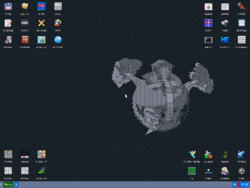Main Page
Jump to navigation
Jump to search
| KolibriOS | |
| KolibriOS logo | |
 KolibriOS desktop | |
| Website: | www.kolibrios.org |
| Developed by: | KolibriOS Project Team |
| License: | GPL |
| Kernel type: | Monolithic kernel |
| Working state: | Active |
KolibriOS is an open source operating system with a monolithic preemptive kernel, video drivers, for 32-bit x86 architecture computers, developed and maintained by The KolibriOS Project Team. KolibriOS is a fork of MenuetOS, written entirely in FASM (assembly language). However, C, C++, Free Pascal, Forth, among other high-level languages and compilers, can also be used in user application development.
English, Russian and German versions are available.
Error creating thumbnail: Unable to save thumbnail to destination
|
Error creating thumbnail: Unable to save thumbnail to destination
|
Error creating thumbnail: Unable to save thumbnail to destination
|
|---|---|---|
Error creating thumbnail: Unable to save thumbnail to destination
|
Error creating thumbnail: Unable to save thumbnail to destination
|
Error creating thumbnail: Unable to save thumbnail to destination
|
| Site | Forum | Nightly builds |
| All pages of wiki | All categories of wiki | How to create new article |
KolibriOS Features
- Boots from several devices, NTFS is also supported. You can even start it from Windows (Windows will shutdown).
- Graphical user interface based on VESA.
- Development kit: code editor with a macro-assembler (FASM) integrated.
- Fits on a single 1.44MB Floppy (many applications are compressed).
- Runs with 8MB of RAM.
- Pre-emptive multitasking, streams, parallel execution of system calls.
- Supported file systems are FAT12, FAT16, FAT32 (long names support), NTFS (partially, read only), ext2/ext3 (partially, read only) and CDFS.
- AC'97 audio codec support for Intel, nForce, nForce2, nForce3, nForce4, SIS7012, FM801, VT8233, VT8233C, VT8235, VT8237, VT8237R, VT8237R Plus and EMU10K1X chipsets.